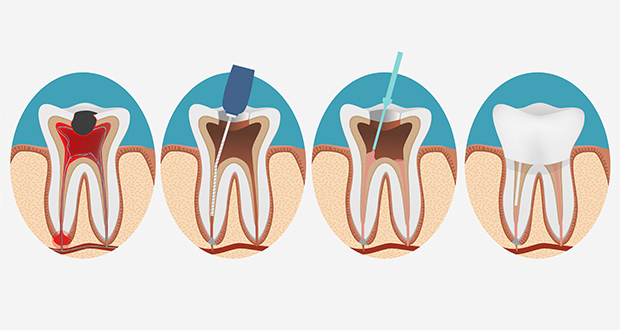Root Canal Treatment

Root canal treatment, also known as endodontic treatment, is a dental procedure performed to treat the inside of a tooth when the pulp becomes infected or inflamed. The pulp is the soft tissue located in the center of the tooth that contains nerves, blood vessels, and connective tissue.
Here’s a step-by-step overview of the root canal treatment process:
1. Assessment and X-rays: The dentist examines the affected tooth and takes X-rays to assess the extent of damage and determine the need for root canal treatment.
2. Anesthesia: Local anesthesia is administered to numb the area around the tooth, ensuring a pain-free experience during the procedure.
3. Access and pulp removal: The dentist creates an access hole in the tooth, typically through the top surface (occlusal) for molars or from the back for front teeth. Specialized instruments are used to remove the infected or inflamed pulp from the tooth’s pulp chamber and root canals.
4. Cleaning and shaping: The dentist uses small files and irrigation solutions to clean and shape the root canals, removing any remaining infected material or debris.
5. Disinfection: Antimicrobial solutions are used to disinfect the root canals, eliminating bacteria and reducing the risk of reinfection.
6. Filling and sealing: Once the canals are thoroughly cleaned and shaped, they are filled with a biocompatible material called gutta-percha. The canals are then sealed with dental cement to prevent bacteria from reentering.
7. Restoration: After the root canal treatment, a temporary filling may be placed in the access hole to protect the tooth. In most cases, a dental crown is recommended to restore the tooth’s strength, protect it from further damage, and restore its appearance.
Root canal treatment is typically performed over one or more visits, depending on the complexity of the case. The number of root canals in a tooth can vary, with some teeth having only one canal and others having multiple canals.
It’s important to note that modern techniques and anesthesia make root canal treatment relatively comfortable for most patients. After the procedure, mild discomfort or sensitivity is common and can be managed with over-the-counter pain relievers. Good oral hygiene practices, regular dental check-ups, and proper dental care can help maintain the treated tooth’s health and longevity.
If you have symptoms of tooth infection or if your dentist has recommended root canal treatment, it’s best to undergo the procedure promptly to alleviate pain, save the tooth, and prevent further complications. It’s important to consult with a qualified dentist or endodontist who will evaluate your specific dental condition and guide you through the treatment process.
Frequently Asked Questions
1Q. Is A RCT painful?
Ans: Experience pain-free root canal treatments at Finedent Dental Clinic in Nallagandla, Hyderabad. Our skilled professionals use advanced techniques to ensure a comfortable and stress-free procedure.
2Q. How long does root canal last for?
Ans: At Finedent Dental clinic in Nallagandla, Hyderabad, our expertly performed root canal treatments are designed to be durable and long-lasting, ensuring patients enjoy restored dental health for years with proper care and maintenance.
3Q. What are the 3 stages of root canal treatment?
Ans: At Finedent Dental clinic in Nallagandla, Hyderabad, our comprehensive root canal procedure comprises three crucial stages: cleaning and shaping the root canal, filling the canal, and final restoration. Our experienced team ensures each step is meticulously performed for optimal dental health.
4Q. Does root canal remove the nerve?
Ans: At Finedent Dental clinic in Nallagandla, Hyderabad, our skilled dental specialists perform root canal treatments aiming to eliminate infected or damaged nerves within the tooth, alleviating pain and preserving the tooth’s structure for long-term oral health.
5Q. Looking for a Dental Clinic near you?
Ans: Ans: Finedent is located in Madhapur (7660000223), Kukatpally (7660000224), Nanakramguda (7660000225), Nallagandla (7660000226).
